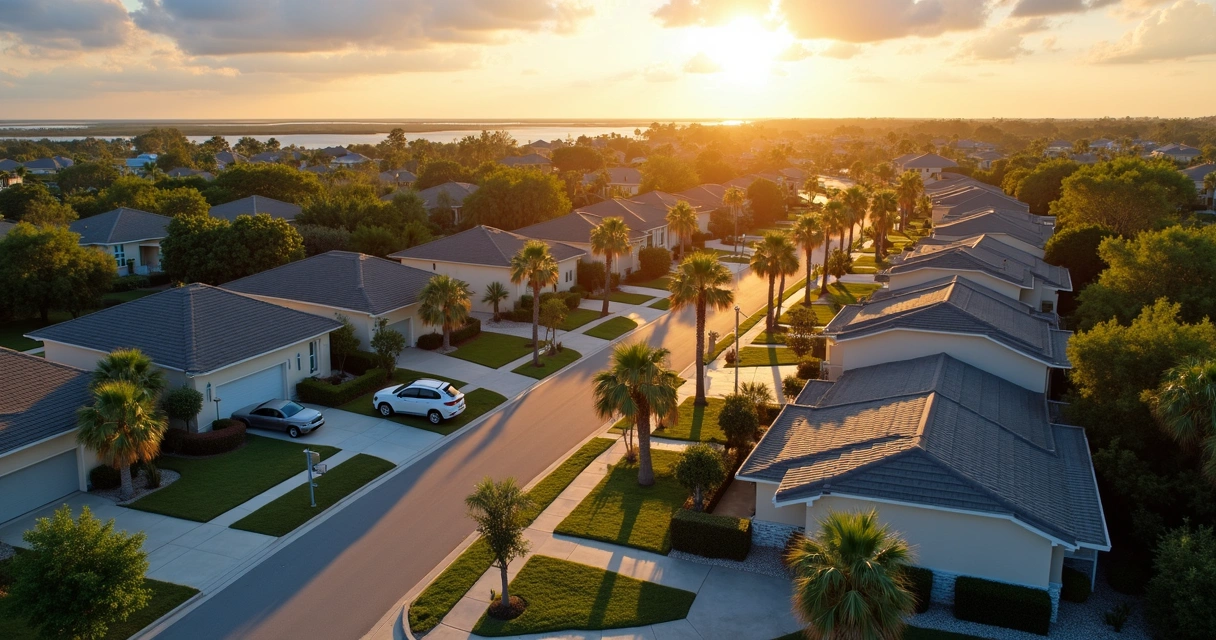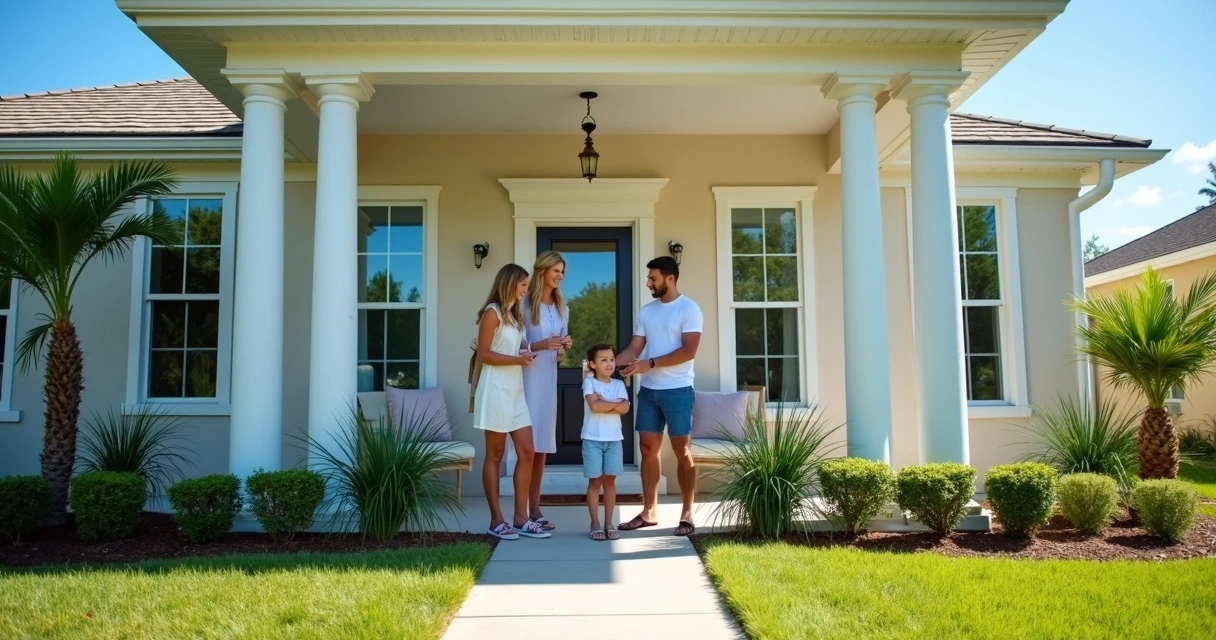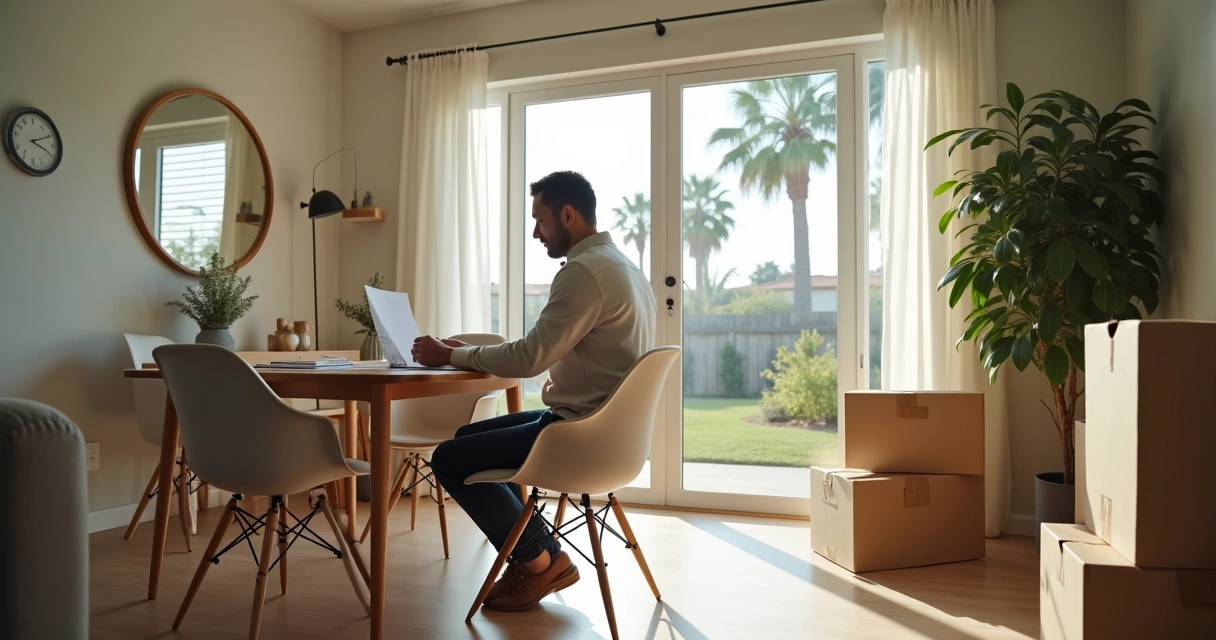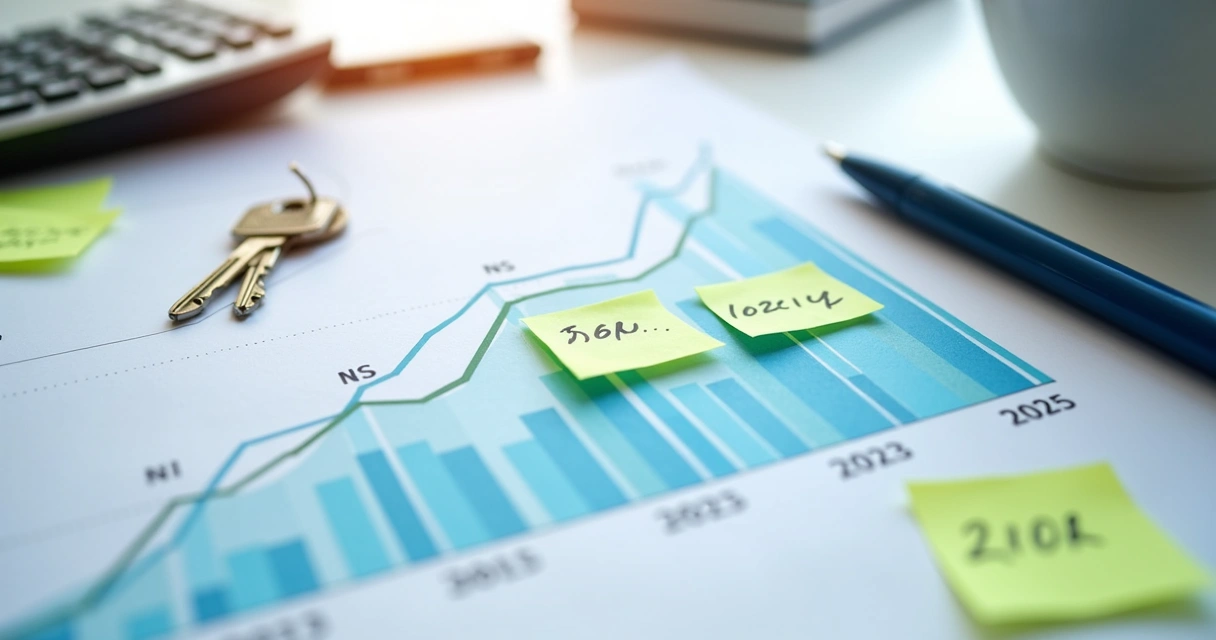Dreaming of a fresh start under the Florida sun, key in hand to your very own front door? If you’re planning to buy your first home in Florida in 2025, you aren’t alone. With sand between your toes and palms swaying in the breeze, that perfect moment feels closer than ever. But sometimes, financial hurdles or confusing mortgage details can cloud the vision.
Florida’s housing market continues to be both active and, for many, pretty intimidating. Between price hikes, changing interest rates, and increased demand, the road to homeownership can look winding. The good news is, there’s more support than you might think. This year brings new and updated mortgage options, especially designed for buyers just like you. Here you’ll find the current landscape laid out in simple language, so you can make decisions with more confidence and less stress.
The current state of buying a home in florida
The Florida real estate market in 2025 is still buzzing. Home prices have leveled off a bit in some areas, but overall, the cost of buying remains higher than it was only a few years ago. Recent data shows a median home price just above $410,000 in early 2025, with certain metro areas even higher. There’s strong demand from both residents and out-of-state buyers.

Mortgage rates for 2025 are a bit lower than their peak in late 2023, often shifting between 5.8% and 6.4% for 30-year fixed loans, though these numbers can and do change month by month. As prices adjust and inventory builds, buyers face competition but also see new windows of opportunity?
But what does it really take to own a home here? Let’s start with the basics: understanding your financing options.
Main home loan choices for first-time buyers
Understanding the main types of mortgage programs can save you a lot of trouble—and maybe some money. In Florida, several home loan programs are especially suited for those stepping into homeownership for the first time. The three best-known government-backed loans are FHA, VA, and USDA, each with its own flavor. Traditional conforming loans, also called conventional loans, round out your main options.
Fha loans: flexible access for many buyers
FHA (Federal Housing Administration) loans are popular among first-time buyers. These loans are insured by the federal government and allow for lower credit scores and down payments than most conventional options. With FHA:
- Minimum down payment starts at 3.5%.
- Credit score needs: usually 580 or above, sometimes allowed as low as 500 with a bigger down payment.
- Income limits: Not set by FHA, but must be enough to afford monthly payments.
- Loan limits for 2025 in Florida are about $498,257 for a single-family home, higher in some expensive counties.
Applicants still need to prove stable income and provide documentation. FHA loans do require mortgage insurance premiums that add to costs, but for many, the doors they open are well worth it.
Va loans: service deserves a reward
If you’re a veteran, active-duty service member, or possibly a surviving spouse, a VA loan could be your golden ticket. These loans—guaranteed by the Department of Veterans Affairs—are often the only way to avoid a down payment entirely. For 2025:
- No down payment required in most cases.
- No private mortgage insurance (PMI).
- Competitive interest rates compared to other programs.
- Eligibility is based on military service; documentation, like your Certificate of Eligibility (COE), is key.
Military service can unlock the door to homeownership.
VA loans do have funding fees—usually folded into the mortgage—but these are sometimes reduced for specific groups, like disabled veterans.
Usda rural loans: not just for farmers
The USDA loan is meant to help those buying in eligible rural or suburban communities. While the idea brings to mind rolling fields, many quiet developments in Florida actually qualify:
- No down payment required.
- Closing costs may be rolled into the loan.
- Income limits: Generally, your household income must fall under 115% of the area median.
- Location restrictions: Only certain addresses are eligible, so check the maps carefully.
The USDA loan in 2025 targets modest homes for moderate-income households, making it a true pathway for buyers in less bustling areas. Some paperwork? Yes. But the reward—a home with little money down—can be significant.
Conventional mortgages: wider range, stricter rules
Conventional or conforming mortgages make up a huge slice of the Florida housing market. These loans are not insured by the government; that brings some advantages, but also more rigid approval requirements. Key details include:
- Down payments as low as 3-5% for first-timers, but 20% needed to skip PMI.
- Minimum credit score typically 620 or higher.
- Stricter debt-to-income and asset guidelines.
- Loan limits usually set by the Federal Housing Finance Agency: $766,550 in Florida for most single-family homes in 2025.
Conventional loans may reward stronger buyers with better rates and fewer lifelong costs, if you have good credit and more cash for a down payment.

Eligibility rules: income, credit, assets
Under the surface of each loan type are detailed rules. This can get overwhelming, so let’s break it down. If you want your application to go smoothly, pay attention to:
- Income. Applicants need to verify income with pay stubs, W-2s, or, if self-employed, extra tax records. Most programs ask for at least two years of steady income.
- Credit score. Every loan type comes with a minimum, but higher scores truly open more doors. For FHA, 580 is a minimum; for conventional, 620 is generally needed, but above 700 will help you secure better interest rates.
- Assets. Lenders want to know if you have savings to cover down payment and closing costs, plus a little left for emergencies.
- Debt-to-income ratio. This measures all your monthly debts versus your income. FHA tends to allow up to about 43%. Conventional loans are more strict, around 36%-43% is common.
- Documentation. Be ready to provide lots of paperwork: identification, bank statements, tax returns, and sometimes explanations for big withdrawals or deposits.
If something looks troublesome in your finances, explain it upfront. Most lenders appreciate honesty and details.
Navigating the full loan process, step by step
The journey from dreaming of a home to actually signing for it has several steps. Missing a single checkpoint can set you back weeks, or even months. Here’s how it usually works:
- Buyer education. Many first-time buyer programs require some kind of homebuyer education class. These courses cover budgeting, what to expect at closing, basic home care, and how to avoid foreclosure. They usually take a few hours—sometimes online—and will likely leave you feeling more prepared.
- Pre-approval. Before you start house-hunting, applying for pre-approval is wise. Lenders will do a full review to estimate how much they’re willing to finance. With a pre-approval letter in hand, sellers know you’re serious. Collect these documents for your file:
- Recent pay stubs
- Tax returns and W-2s
- Bank statements
- Photo ID
- Proof of any extra income
- Application. Once you’ve found a home, you’ll submit a full mortgage application. This often involves lots of back and forth with your lender’s team as they verify every detail.
- Processing and underwriting. Behind the scenes, your file is reviewed, appraisals are arranged, and your finances are checked top-to-bottom.
- Loan commitment. When all looks good, your lender issues a "clear to close." Sometimes a last-minute request for documents appears here—don’t panic, just deliver what’s needed.
- Closing. This final meeting, often at a title company’s office, is where you sign all the documents, pay any remaining costs, and receive your keys.
Your pre-approval letter changes the way sellers look at you.
Down payment help and closing cost programs
Saving the down payment remains a true challenge for many families. It is hard not to worry about it. But Florida has state, county, and city-based incentives that can soften the blow. Buyers in 2025 will find several resources, such as:
- Down payment assistance (DPA) grants: Sometimes offered as a true grant, which never needs to be paid back, often tied to income or regional requirements.
- Forgivable loans: Zero-interest loans that are erased if you stay in your home for a set number of years. Five- or ten-year forgiveness periods are most common.
- Deferred payment loans: Payment is postponed until you sell, refinance, or pay off the first mortgage.
- Mortgage credit certificates (MCCs): These programs can give you a tax break, letting you claim back a portion of mortgage interest paid every year, which increases your net income and makes monthly payments feel lighter.

Each program has its own deadlines and budgets. Some run out of funds mid-year, especially in busy markets. If you think one of these programs will help, apply as early as you can—waiting might mean missing out for the year.
How florida’s tax credits and incentives work
Many first-time buyers ask about tax benefits. While the federal mortgage interest deduction still exists, there are also state-based mortgage credit certificates (MCCs). If you qualify, an MCC can refund part of your mortgage interest as a direct credit on your tax bill. In 2025, the benefit can be up to $2,000 per year in Florida for qualified buyers. Not everyone will get this, and you must apply before closing, as part of your mortgage process.
Some incentives are first-come, first-served.
The property tax situation in Florida also gives buyers a little breathing room. Homestead exemptions, for those who make their new place a primary residence, can lower your property tax bill by up to $50,000 in assessed value. It’s well worth looking into as soon as you move in.
When and how to apply for florida buyer programs
Florida’s support programs for buyers each have an annual budget. They tend to open early in the year and can pause applications if too many buyers apply or funding ends. In general, you should:
- Talk to an approved lender who can explain which state and local programs you might qualify for. Each program has its own participating partners and rules.
- Apply for down payment assistance at the same time as your main mortgage loan. Do not wait until after you’ve signed your purchase contract.
- Have your homebuyer education certificate ready if it’s needed for eligibility, as most of these programs require proof you’ve completed this training.
- Stay organized: the process can be paperwork-heavy and move quickly once you find a home.
Many programs are only available to buyers who have not owned a home in at least three years. That technicality matters more than you might think—ask if you’re not sure.
Current interest rates in florida’s mortgage market
Interest rates are always changing. In 2025, they are lower than the spikes in early 2023, but still far above what buyers saw in the early 2020s. For a 30-year fixed mortgage in Florida:
- Conventional and FHA loans: ~5.8% to 6.4% (APR may vary)
- VA and USDA: typically slightly lower, often around 5.7% to 6.1%
- 15-year mortgages: Can be about 0.6% lower, but with higher monthly payments

Buyers focused on their monthly budgets may want to compare different loan durations. Sometimes paying more upfront in points can lower your interest rate, but this isn’t always the right move. Everyone’s financial math is a bit different.
Strategies to get better rates and boost approval chances
Getting a lower interest rate or higher loan approval amount is more doable than it seems, but not always simple. Small changes make a difference.
- Strengthen your credit score before starting: pay down cards, avoid new loans, and check your report for errors.
- Save up for a bigger down payment. Even an extra one or two percent can shift your application from risky to more attractive, lowering your overall costs.
- Shop around with multiple approved lenders. Rates and closing costs can vary.
- Provide clear, organized paperwork. A fast, responsive applicant often enjoys a smoother approval process.
- If your debt-to-income ratio is too high, try to pay off a car or personal loan before you apply.
- Don’t change jobs or make big bank transfers close to your application date, unless absolutely necessary and always with documentation.
Sometimes, just waiting a month or two can give your finances the boost needed. The right move depends on your situation and goals.
Opportunities and hurdles for florida homebuyers in 2025
No way around it—Florida’s homebuyers face some real challenges in 2025. But each challenge has a flip side: a new program, a changing rule, or a trick that can move you forward. Supply is ticking up in many areas, and with added state and federal support, future homeowners have more real chances than ever.
- Programs for first-timers can slash down payments and closing costs, making that first step less scary.
- Property tax breaks and mortgage credits offer ongoing financial breathing room after closing.
What we see time and again: buyers who learn about these programs and reach out early tend to buy sooner, with less stress and more long-term security. And yes—sometimes, it all comes together more quickly than you expected. Maybe with just a tinge of luck and a lot of preparation.
So, how can you move forward?
Start with education, then gather your records, and don’t be afraid to ask questions—even if you feel lost. It might not all be straightforward, but, really, that’s just part of the story when you’re buying your first home in a place as unique as Florida.
Patience and persistence turn dreams into keys.
Whether you’re drawn to beaches, big cities, or the quiet suburbs, homeownership is possible. In 2025, Florida’s loan programs are the backbone for thousands finding their way to a front porch, a backyard barbecue, and the security of a home you can truly call your own.
Conclusion
Florida’s first-time homebuyer programs in 2025 open doors for a wide range of new owners. From government-backed FHA, VA, and USDA loans to flexible conventional options, assisting programs make the journey more accessible. Meeting eligibility often involves steady income, reasonable credit, and some paperwork diligence. With patient preparation, clear records, and knowledge of available programs, turning your Florida home dream into reality is within reach.
Frequently asked questions
What are the main Florida home loan options?
Florida buyers in 2025 can choose between FHA, VA, and USDA home loans, as well as conventional mortgages. FHA and USDA loans often require low or no down payments and are designed for those who might not meet stricter conventional guidelines. VA loans benefit qualified veterans and service members. Conventional loans are great for buyers with stronger credit and savings. Many buyers can also find help with down payment grants and closing cost assistance from state or local programs.
How do I qualify for 2025 loan programs?
Qualifying usually means meeting income, credit score, and asset guidelines. FHA often accepts scores as low as 580; conventional loans look for 620 or higher. You’ll need proof of steady income, documents like tax returns and pay stubs, plus a clear picture of your debts and assets. For many programs, you must be a first-time buyer or not have owned a home in the past three years. Some programs also require completion of a homebuyer education class before closing.
Are there special loans for first-time buyers?
Yes, several options are geared to first-time homebuyers. FHA, VA, and USDA loans commonly have lower down payment requirements or no money down. Florida offers special incentives, such as down payment assistance, forgivable loans, and tax credits specifically for those who have not owned a home recently. These programs can make homeownership much more affordable for new buyers in 2025.
Where can I find the best loan rates?
Looking for the best rate means comparing offers from approved lenders familiar with Florida’s loan programs. Interest rates are affected by market trends, your credit, loan type, and down payment. Ask for official loan estimates from at least three different sources to compare. You can also improve your rate by raising your credit score, increasing your down payment, or choosing a shorter mortgage term if that fits your budget.
Is it worth applying for Florida home loans?
For most first-time buyers who qualify, applying for Florida home loan assistance is definitely worthwhile. These programs can reduce your upfront costs, make monthly payments more manageable, and sometimes offer tax savings after move-in. Even if you’re unsure you meet all requirements, it’s often worth checking eligibility with a qualified lender, as some programs have more flexible rules than you might expect.





